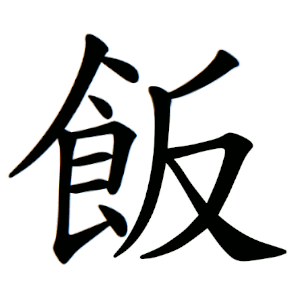飯
- cooked rice;
- a meal;
- to eat a meal;
Etymology
Usage in Korean
吃飯 (식반) — to eat, to have a meal
早飯 (조반) — breakfast (lit. morning meal)
午飯 (오반) — lunch (midday meal)
晚飯 (만반) — dinner, evening meal
飯店 (반점) — restaurant, hotel (lit. “meal shop”)
飯桌 (반탁) — dining table
Additional notes
In Chinese, 飯 often stands for a meal in general, not just “rice.”
In Korean, 飯 is the hanja for 밥, the staple “cooked rice,” but also carries the broader meaning of meal/food.
In Japanese, 飯 (meshi, han) is commonly used for cooked rice and by extension “meal,” but often replaced in compounds by 食.
Words that derived from 飯
飯
밥
반
bap
ban
Kangxi radical:184, 食 + 4
Strokes:13
Unicode:U+98EF
Cangjie input:
- 人戈竹水 (OIHE)
Composition:
- ⿰ 飠 反 (G H T J V)
- ⿰ 𩙿 反 (K)
